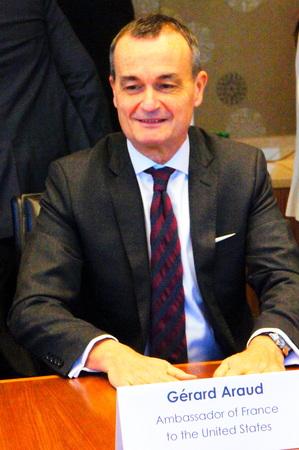 Formally, as the Ambassador of the Republic of France to the United States, Gérard Araud should be addressed as Your Excellency. Even though his mother loves it, he says, "it's rather silly." Still, it comes with the territory, which is no longer the highly charged General Assembly of the United Nations, where he served for five years as France's permanent representative but, since last year, inside Washington's Beltway. He was in Seattle for discussions on international business relations hosted by the French-American Chamber of Commerce and the UW's International School of Business.
Formally, as the Ambassador of the Republic of France to the United States, Gérard Araud should be addressed as Your Excellency. Even though his mother loves it, he says, "it's rather silly." Still, it comes with the territory, which is no longer the highly charged General Assembly of the United Nations, where he served for five years as France's permanent representative but, since last year, inside Washington's Beltway. He was in Seattle for discussions on international business relations hosted by the French-American Chamber of Commerce and the UW's International School of Business.
Araud, born in Marseille, has had a lightning public career not atypical of the French intellectual elite: degrees from the country's top schools in math, engineering, and public policy. On-the-ground expertise in the Middle East. Former ambassador to Israel. High-level postings in national and international security inside the Foreign Ministry and in NATO. Historian with a special interest in World War One. Faultless English.
Personable but blunt, Araud says of last month's terrorist attacks in Paris, "We are all threatened by the same enemy." At the same time, he acknowledges being deeply moved and touched by the reaction of the American people.
He is happy to be in Seattle, where he once hiked Mt. Rainier. He is happy to be out of the diplomatic bubble, and to see that in the real world, the business community is working energetically to fight climate change, not deny it. "Everybody is on board," he says. Inside the Beltway, there's only Congress, with its know-nothing politicians elbowing one another for right-wing prominence. "Silliness on the Hill."
He is open, however, about the difficulty American companies have when they try to work with the French. "Our big shortcomings," he acknowledges, "are rigidity and bureaucracy. We cannot change this overnight. We must address small blockages one by one, especially in the labor market." This, mind you, from the official representative of a socialist government.
The biggest immediate threat, as he sees it, is that terrorism will hurt the French tourist industry. With 86 million international visitors annually, tourism accounts for seven percent of French GDP and contributes over $40 billion to the national economy. Americans, as we've noted, make up a modest 3 million of the visitors, but tend to stay at more expensive hotels and eat fancier meals. They should get out of Paris more, everyone agrees, and spend time in the provinces. But there's a surprising lack of four- and five-star hotels in regions that Americans would most like to visit, such as Bordeaux, or the Normandy battlefields.
Of course, there could be yet another attack, which would collapse international tourism. The US Visa Waiver program could collapse, too, as could the entire Schengen accord which allows for freedom of travel within the European Union.
Some 10 years ago, a previous ambassador, Jean-David Levitte, spoke to a gala audience in Seattle about French-American relations. Cornichon reported then:
Like any long-married couple, our interests are inextricably intertwined. US investment in France is responsible for 500,000 jobs while French investment in America ($150 billion) has created jobs for 600,000 workers here. A lot of French technology goes into the Boeing Dreamliner, while 40% of the new Airbus 380 is being built in the US. We have our differences, to be sure, but we're "best allies" nonetheless, with a lifetime of shared values.Does this mean we can stop making rude-French-waiter jokes? Probably not. But "cheese-eating surrender-monkeys"? A bit much.
Flash forward to this morning's breakfast with His Excellency, where he ponders questions like this: we can get wine from Burgndy and ham from Bayonne in the US, but not French yogurt. Now, that's silly.
Leave a comment